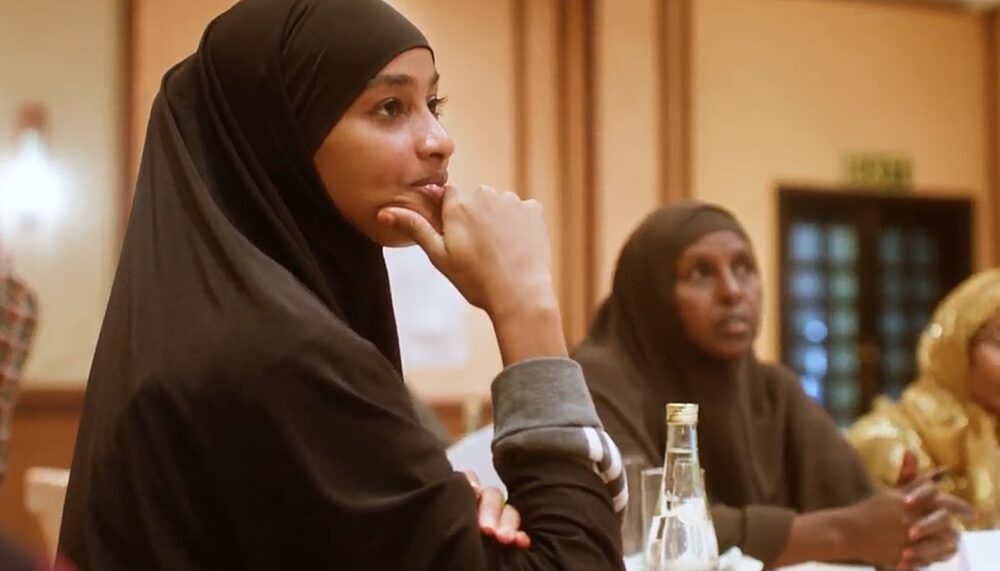BLOG POST | 17 Oct 2025
Advancing women's leadership for climate and peace
Gender-inclusive environmental peacebuilding in Somalia

Learn more about our approach to supporting Somali women in building inclusive peace and climate resilience.
By Teresa Isabel Andion-Wessel
For over a decade, the Berghof Foundation has supported inclusive peacebuilding in Somalia. Since 2015, we have focused on addressing the root causes of conflict – clan tensions, land disputes, and environmental degradation – through locally-led, sustainable solutions. Central to this work has been the development of the Insider Peacebuilders Network (IPN) – a growing network of over 100 local peacebuilders, many of whom are women, who lead mediation, dialogue, and environmental peacebuilding efforts in their communities.
Advocating for more inclusivity since the beginning
Inclusivity has been a guiding principle in Berghof’s Somalia programming since day one. Whenever possible, we apply gender participation quotas to our activities, which include capacity development workshops and community dialogues, with a target of 50 per cent and a minimum of 30 per cent female participation.
Yet, quotas alone are not enough. It is one thing to ensure women are in the room, and another to ensure they can meaningfully participate. That is why we make sure all facilitators – whether local staff or external partners – are equipped with the competencies to create inclusive, participatory spaces.
To further amplify women’s voices, we employ a range of creative tools, from radio shows to participatory research. We continue to build platforms for women to share their stories, the latest being a short docuseries filmed during the most recent Women’s Peace Leadership workshop.
Gendered climate impacts as a turning point
Across Somalia, it has become increasingly evident that the effects of environmental degradation and climate-related risks are strongly gendered. Through the development of four Climate Security Action Plans (CSAPs) in climate and conflict hotspots throughout Hirashabelle and Galmudug states, we were able to gather data on how the effects of climate change disproportionately affect women.
For example, in focus group interviews, women in the coastal city of Adale reported that expanding sand dunes – driven by stronger, more consistent winds – block roads and restrict emergency healthcare access. When ambulances or other vehicles become stuck, the lives of birthing mothers and their babies can be put at risk, and families face significant financial burdens due to delays and the need to hire additional vehicles.
Rising temperatures and prolonged droughts have also caused desertification and reduced food availability. While this poses health risks for all Somalis, our interviewees emphasised the particular impact on pregnant women who struggle to get sufficient nutrients. The stories shared revealed how deeply gendered climate-related risks are; these stories were the catalyst for us to launch a Women, Peace and Security (WPS)-focused pilot track within our programming.
Strengthening women’s leadership
The main goals of this new programme are to address the gendered climate-related risks, to further strengthen women’s role as peace leaders and to identify gender-sensitive responses to climate and conflict in Somalia.
Our first major activity was a capacity-building workshop in Rwanda. Throughout the four-day workshop, the women discussed the interlinkages of climate-insecurity, conflict, and gender. They met with local peacebuilding organisations supporting women’s peace leadership at the climate-conflict nexus to exchange on their experiences. They also learned how inclusive legal frameworks and economic support have increased women’s political participation in post-genocide Rwanda.
Coming out of the first workshop, we supported women IPN members to organise large Iftar gatherings in Jowhar and Galkayo to celebrate International Women’s Day. These events brought together over 120 women from diverse backgrounds across the two districts to reflect on the role of women in peace, security and environmental conservation, as well as offering the opportunity to exchange with peers. Another example we supported, showcasing how a workshop participant applied the leadership and practical tools gained, is a community clean-up initiative launched by a young woman inspired by Rwanda’s environmental peacebuilding model.
A second workshop took place in Kenya and was facilitated by an experienced mediator who shared real-life examples and practical tips for mediation processes. The women discussed how to build a constituency, strengthen grassroots leadership, and strategies to foster social cohesion within their communities. The gender focal point from Somalia’s Ministry of Interior, Federal Affairs and Reconciliation also joined to ensure stronger links between community voices and national policymaking.
Between the two in-person workshops, we facilitated online sessions to maintain momentum within the group and keep the conversations going.
Currently, women from the IPN are conducting focus group discussions with women peace leaders in their communities to inform a gender analysis that will enhance the gender-sensitivity of our programming and support the development and implementation of policies promoting women’s visibility and participation in national processes.
Building a future with women at the centre
With our WPS track now in full swing, we remain committed to ensuring that women are not just included but are central to shaping Somalia’s peaceful and resilient future.
As we mark the 25th anniversary of UNSCR 1325, we encourage government actors, international donors, and peacebuilding partners to continue supporting the WPS Agenda by:
- Investing in women-led peacebuilding efforts, particularly in climate-affected regions.
- Integrating gender-sensitive approaches into all climate security and peace processes.
- Ensuring sustained political will and funding for long-term, locally driven solutions led by women.
Together, we can ensure that Somalia’s journey toward peace and resilience is one where women are not only present but leading the way.
Media contact
You can reach the press team at:
+49 (0) 177 7052758
email hidden; JavaScript is required


